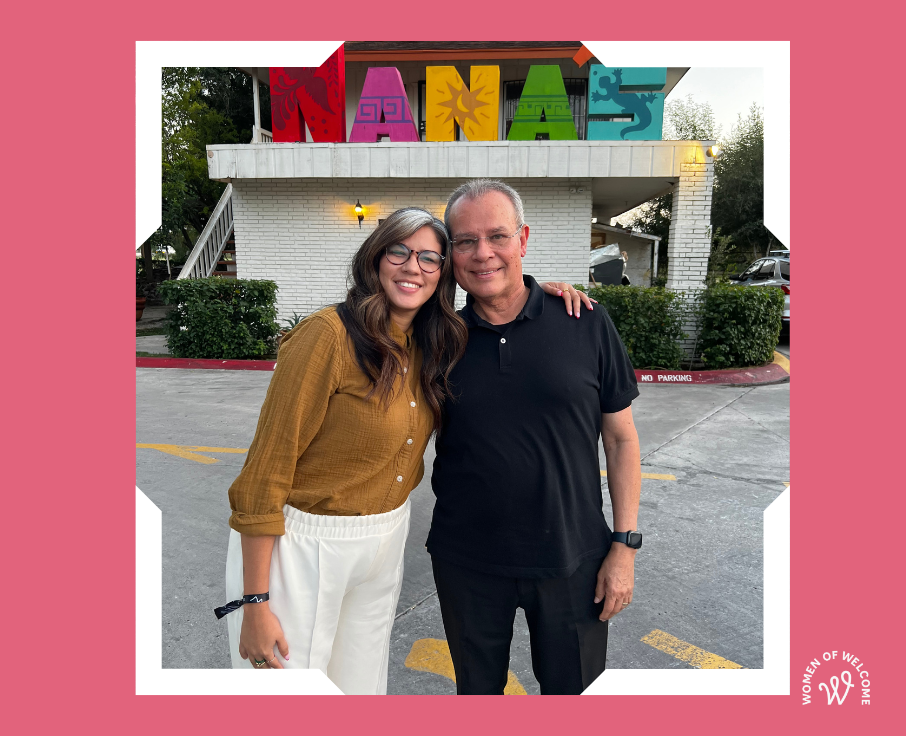When my mom was nine months pregnant with me, she, my dad, and my sister had to flee their home country of Nicaragua suddenly. A war had broken out and the fighting was spilling out into the streets of the capital where they lived. Because of my dad’s line of work, he was targeted by the guerrilla fighters. Our family wasn’t safe.

I can picture my mom all those years ago, belly round with innocent life, and I wonder how she felt. I imagine she was fearful, unsure of how the situation would resolve; I imagine my parents feeling lost in the chaos, confused by the way their plans for starting a family had been upended. No one wants to become a refugee at nine months pregnant and with a young child.
They crossed over into Honduras where I was born, and life seemed precarious. I try to imagine the questions my parents asked themselves. Where would we go? Would we ever be safe again? How would we rebuild?

Eventually my parents were able to come to Miami, FL. At first, they stayed in the living room of a friend’s apartment. My parents have told us the stories of all four of us sleeping in one room—the difficulties and the joys of those humble beginnings.
I’ve had to rely on my parents’ stories a lot, since I was so young and don’t have any memories of that time. This is why stories are important. When we take time to listen to one another’s stories it gives us perspective. It fosters empathy, creates connection, and provides understanding we might not have had.

One story my dad has shared with me is how he had to find work in order to provide for his young family. Since he went to architecture school in Nicaragua, he had experience in that field and was able to find work as a draftsperson. Unfortunately, he didn’t have a work visa at the time and chose to use an alias, Jose, to get hired. When he was finally able to obtain a work visa he approached his boss, probably teeming with anxiety, to tell him the truth and reveal his true identity. His boss fired Jose on the spot, but then immediately hired my dad under his actual name. I don’t know who that man was, but I’m grateful for his understanding, empathy, and belief in my dad.
Which leads me to the importance of compassion. As a Christ follower I am called to be compassionate. This isn’t always easy, but it’s all over the Bible.
And be kind and compassionate to one another, forgiving one another, just as God also forgave you in Christ. – Ephesians 4:32
Therefore, as God’s chosen ones, holy and dearly loved, put on compassion, kindness, humility, gentleness, and patience. – Colossians 3:12
Finally, all of you be like-minded and sympathetic, love one another, and be compassionate and humble. – 1 Peter 3:8
We also serve a compassionate God:
The Lord is gracious and compassionate,
slow to anger and great in faithful love.
The Lord is good to everyone;
his compassion rests on all he has made. – Psalm 145:8-9
Unfortunately, sometimes Christ followers forget this call to be compassionate and get distracted by the political circus that surrounds us. No matter the public policy that is put into place, we are called to be a people of love, grace, mercy, compassion, and welcome. We see beyond labels or status. We strive to see people the way God sees them—as beloved image bearers worthy of dignity. This doesn’t mean we will always agree on policy or laws that should or should not be put into place. But it does mean that we will not be mean-spirited or rude or dismissive. Our words are seasoned with grace. Our attitudes are seasoned with love.
I once heard a pastor say that we can never love anyone above the label we give them, that’s why the only label we should give anyone is neighbor. I’ve never forgotten that. “Love your neighbor as yourself.” Those were the words of Jesus, weren’t they?
There’s another story my dad shared that I like to reflect on. Immigration paperwork is notoriously complicated, especially for someone who is trying to figure it out in a language that is not their native tongue. When my dad was looking for help, he found it in a church. An Episcopalian church in Miami set up a clinic with immigration lawyers to provide legal aid for immigrants to help them navigate the complicated web of paperwork and policy. An example of the church being the church—seeing the vulnerable, offering relief, loving, welcoming. That gesture from the church changed our lives. Whose life could you change?

My prayer for the Church is that we could reflect the love of Christ to the most vulnerable among us. That we would stand as a bold witness to unite in a world that often tries to divide. That we would tell stories and listen to stories. That compassion would not be far off. That we would be a people of welcome.
__________
Keep up with Kristel on social media (@KristelAce) or on her website: KristelAcevedo.com

 This resource answers the most common questions Christians have about immigration and equips you to engage conversations with biblical clarity, truth, and grace.
This resource answers the most common questions Christians have about immigration and equips you to engage conversations with biblical clarity, truth, and grace.